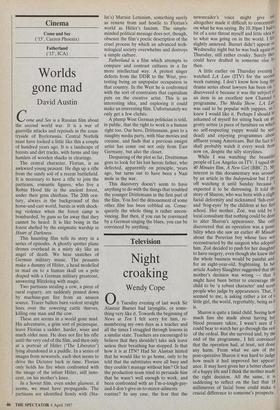Cinema
Come and See ('15', Curzon Phoenix) Fatherland (`15', ICA)
Worlds gone mad
David Austin
Come and See is a Russian film about the second world war. It is a war of guerrilla attacks and reprisals in the coun- tryside of Byelorussia. Central Norfolk must have looked a little like this a couple of hundred years ago. It is a landscape of forests and dirt tracks, with farms and tiny hamlets of wooden shacks in clearings.
The central character, Florian, is an awkward young peasant. He digs up a rifle from the sandy soil of a recent battlefield. It is necessary to have a rifle to join the partisans, romantic figures, who live a Robin Hood life in the ancient forest, under their grim chieftain. The 20th cen- tury, always in the background of this horse-and-cart world, bursts in with shock- ing violence when the forest camp is bombarded, by guns so far away that they cannot be heard. It is like being in the forest shelled by the enigmatic warship in Heart of Darkness.
This haunting film tells its story in a series of episodes. A ghostly spotter plane drones overhead in a misty sky like an angel of death. We hear snatches of German military music. The peasants make a dummy of Hitler, a head modelled in mud on to a human skull on a pole draped with a German military greatcoat, answering Blitzkrieg with magic.
Two partisans stealing a cow, a piece of rural roguery, are suddenly pinned down by machine-gun fire from an unseen source. Tracer bullets burn violent straight lines over the cowering cattle thieves, killing one man and the cow. , These are scenes in a world gone mad. His adventures, a grim sort of picaresque, leave Florian a sadder, harder, wiser and much older man. He does not fire his rifle until the very end of the film, and then only at a portrait of Hitler (`The Liberator') lying abandoned in a puddle. In a series of images from newsreels, each shot seems to drive the Dictator back in time. Florian only - holds his fire when confronted with the image of the infant Hitler, still inno- cent, on his mother's knee.
In a Soviet film, even under glasnost, it seems, we must have propaganda. The partisans are identified firmly with (Sta- lin's) Marxist Leninism, something surely as remote from and hostile to Florian's world as Hitler's fascism. The simple- minded political message does not, though, obscure the film's poetic description of the cruel process by which an advanced tech- nological society overwhelms and destroys a simple culture.
Fatherland is a film which attempts to compare and contrast cultures in a far more intellectual way. A protest singer defects from the DDR to the West, pro- testing being an unpopular occupation in that country. In the West he is confronted with the sort of constraints that capitalism puts on the creative artist. This is an interesting idea, and exploring it could make an interesting film. Unfortunately we only get a few clichés.
A plump West German politician is told, in public, that the right to work is a human right too. Our hero, Drittemann, goes to a naughty media party, with blue movies and cocaine, and finds that a previous emigre artist has come out not only from East Germany, but also the closet.
Despairing of the plot so far, Dreitteman goes to look for his lost heroic father, who defected, apparently on principle, 'years ago, but turns out to have been a Nazi mole in the war.
This discovery doesn't seem to have anything to do with the things that troubled the younger Drittemann in the first part of the film. You feel the denouement of some other, film has been cobbled on. Conse- quently the whole thing is rather uncon- vincing. But then, if you can be convinced by a German singing the blues, you can be convinced by anything.


























































 Previous page
Previous page